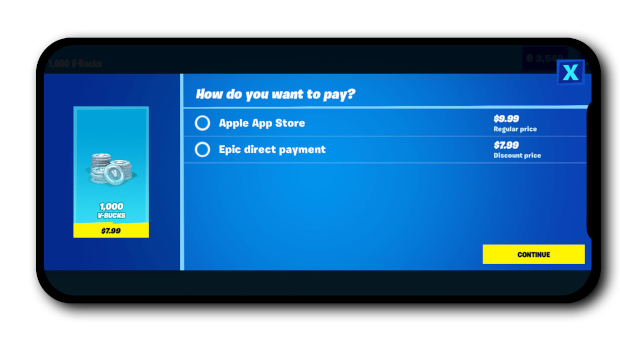
Apple ready to terminate Epic account over Fortnite direct payments
The dispute between Fortnite developer Epic Games and Apple over in-app payments has escalated with Cupertino vowing to pull the company’s developer licence, and hence any access to the App Store, on 28 August.
Fortnite may not be burning up the App Store charts like it used to, but it’s still one of the most popular games of all time, with players in the tens of millions. We don’t know how many of them play on mobile devices, but Epic Games (Fortnite’s creator) is willing to gamble that entire market to defy Apple and Google’s app store rules in an escalation of an ongoing, industry-wide antitrust battle.
If you don’t know, Fortnite allows players to buy in-game stuff (outfits, dance moves, that sort of thing) with a virtual currency called V-bucks. It’s akin to the gems, diamonds, energy, and other virtual currencies used in so many other mobile or free-to-play games.
Epic Games argues that V-bucks cost 20% less than they used to. If you’re playing the game on PC, Mac, or console, boom – the price is just cheaper.
If you’re playing on iOS or Android, however, it’s a little more complicated. When you go to buy V-bucks, you are now presented with options. If you choose to purchase through the App Store or Google Play Store, you pay the old price. Epic has added a direct payment option, which uses payment info attached to your Epic account (or lets you enter new payment details) and gives you the 20% discount.
Epic Games is quite direct in its explanation for why the price is higher for those who buy through the App Store:
Currently, when using Apple and Google payment options, Apple and Google collect a 30% fee, and the up to 20% price drop does not apply. If Apple or Google lower their fees on payments in the future, Epic will pass along the savings to you.
A deliberate and direct violation
This is, of course, a direct violation of Apple’s app store rules. Section 3.1.1 of the App Store Review Guidelines spells it out: If you sell anything in your app or offer any sort of unlocked functionality, you must use Apple’s in-app payments processing exclusively. The Google Play store operates in a similar fashion, though it is possible to download and run Fortnite on an Android device directly or, on Samsung devices, through the Samsung app store.
Is this a privacy and security issue about protecting your payment info? Definitely not. Apple allows apps that sell real-world physical goods and services to use their own payment processing. So apps from Starbucks to Amazon to Uber and beyond can have their own payment systems in place, and collect and store your payment information. Apple’s rule only applies to digital content, and even then it has exceptions for a particular class of applications it calls ‘reader’ apps (like Kindle and Netflix). Hundreds of millions of iPhone and iPad users regularly use apps that include their own payment processing.
Fortnite’s violation of App Store rules is no accident. Epic Games’ CEO Tim Sweeney has been a vocal critic of Apple’s policies and rules on iOS, recently telling CNBC: “Apple has locked down and crippled the ecosystem by inventing an absolute monopoly on the distribution of software, on the monetisation of software.”
Epic Games is deliberately provoking Apple and Google, just as the companies are in the hot seat over antitrust allegations, both in the US and around the world. The company faces several antitrust investigations in the European Union, for example. Apple recently came under fire for preventing the distribution of both Microsoft’s xCloud gaming service and the live gameplay features of Facebook Gaming.
Both Google and Apple are obligated to remove the app from their app stores, or else open the floodgates to all manner of other apps selling digital goods with their own payment processing, just as sellers of physical goods and services do.
This would entirely remove one of the world’s most popular games with tens of millions of fans from iPhones and iPads. Those with Android phones would still be able to play by downloading the game directly from Epic, an option Apple users do not have.
When Apple inevitably removes Fortnite from the App Store, it will add fuel to the fire of Apple’s current antitrust problems. It will serve as another huge example to drag before regulatory bodies and courts; a grand demonstration of how Apple’s rules and policies harm not only companies that would compete with it, but customers as well.
Epic springs the trap
Lest anyone doubt this entire move was a deliberate provocation by Epic Games to spring a trap on Apple, the company announced the reveal of an in-game animated short Nineteen Eighty-Fortnite recalling Apple’s historic 1984 Macintosh ad. To say the company expected its game to be taken down from the App Store is an understatement.
Epic Games is trying to paint Apple as the new IBM, the controlling Big Brother that Apple was toppling in its 1984 Macintosh ad.
It’s not just a PR stunt, either. Epic Games has filed a Complaint for Injunctive Relief (PDF link) in the Northern District of California, alleging 10 violations of the Sherman Act and California law.
On 17 August Epic Games tweeted that the situation has escalated: “Apple removed Fortnite from the App Store and has informed Epic that on Friday, August 28 Apple will terminate all our developer accounts and cut Epic off from iOS and Mac development tools. We are asking the court to stop this retaliation.”
IDG News Service






Subscribers 0
Fans 0
Followers 0
Followers